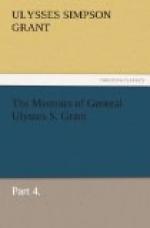The criticism has been made by writers on the campaign from the Rapidan to the James River that all the loss of life could have been obviated by moving the army there on transports. Richmond was fortified and intrenched so perfectly that one man inside to defend was more than equal to five outside besieging or assaulting. To get possession of Lee’s army was the first great object. With the capture of his army Richmond would necessarily follow. It was better to fight him outside of his stronghold than in it. If the Army of the Potomac had been moved bodily to the James River by water Lee could have moved a part of his forces back to Richmond, called Beauregard from the south to reinforce it, and with the balance moved on to Washington. Then, too, I ordered a move, simultaneous with that of the Army of the Potomac, up the James River by a formidable army already collected at the mouth of the river.
While my headquarters were at Culpeper, from the 26th of March to the 4th of May, I generally visited Washington once a week to confer with the Secretary of War and President. On the last occasion, a few days before moving, a circumstance occurred which came near postponing my part in the campaign altogether. Colonel John S. Mosby had for a long time been commanding a partisan corps, or regiment, which operated in the rear of the Army of the Potomac. On my return to the field on this occasion, as the train approached Warrenton Junction, a heavy cloud of dust was seen to the east of the road as if made by a body of cavalry on a charge. Arriving at the junction the train was stopped and inquiries made as to the cause of the dust. There was but one man at the station, and he informed us that Mosby had crossed a few minutes before at full speed in pursuit of Federal cavalry. Had he seen our train coming, no doubt he would have let his prisoners escape to capture the train. I was on a special train, if I remember correctly, without any guard.
Since the close of the war I have come to know Colonel Mosby personally, and somewhat intimately. He is a different man entirely from what I had supposed. He is slender, not tall, wiry, and looks as if he could endure any amount of physical exercise. He is able, and thoroughly honest and truthful. There were probably but few men in the South who could have commanded successfully a separate detachment in the rear of an opposing army, and so near the border of hostilities, as long as he did without losing his entire command.
On this same visit to Washington I had my last interview with the President before reaching the James River. He had of course become acquainted with the fact that a general movement had been ordered all along the line, and seemed to think it a new feature in war. I explained to him that it was necessary to have a great number of troops to guard and hold the territory we had captured, and to prevent incursions into the Northern States. These troops could perform this service just as well by advancing as by remaining still; and by advancing they would compel the enemy to keep detachments to hold them back, or else lay his own territory open to invasion. His answer was: “Oh, yes! I see that. As we say out West, if a man can’t skin he must hold a leg while somebody else does.”




